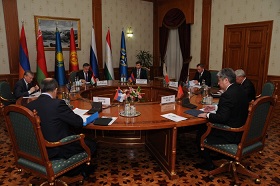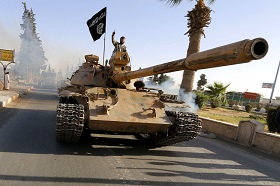Against the wider background in Central Asia, the strengthening of the IS extremist group risks further destabilizing the situation in the countries neighboring Russia. Of all the Central Asian states, Tajikistan and Turkmenistan appear to be the most vulnerable in this respect, due to their proximity to Afghanistan, setting aside for a moment the fact that these two former Soviet republics.
Against the wider background in Central Asia, the strengthening of the IS extremist group risks further destabilizing the situation in the countries neighboring Russia.
Given the unstable statehood system [1] in almost all countries of Central Asia [2], ethnic tensions among the populations of post-Soviet countries [3], economic problems, corruption, cronyism, and other factors, it is difficult to seriously discuss their effective ability to counter the threats of extremism and terrorism that emanate from Afghanistan.
Of all the Central Asian states, Tajikistan and Turkmenistan appear to be the most vulnerable in this respect, due to their proximity to Afghanistan, setting aside for a moment the fact that these two former Soviet republics have porous borders open both to drug trafficking and to the flow of illegal migrants and extremists, who have been penetrating the post-Soviet space in recent years. Back in mid-2014 Turkmenistan started erecting obstacles along the entire length of its border with Afghanistan to prevent extremists’ entering its territory. The problems that Tajikistan faces are even more acute.
At the Collective Security Treaty Organization (SCTO) member-states’ foreign ministers’ meeting, held in Dushanbe on April 2, 2015, a question was raised about the implementation of the decision “On the provision of assistance to the Republic of Tajikistan to strengthen the Tajik-Afghan border”, adopted by the CSTO summit in Sochi on September 23, 2013. In 2013, the plan was to realize this project in two stages. The first stage involved supplying Tajik border guards with modern weapons, special gear and other necessary equipment. The second involved a targeted approach to the Tajik-Afghan border that included developing an interstate program.
According to CSTO Secretary General Nikolai Bordyuzha, despite the fact that a large-scale invasion of the CSTO member-states’ territory from Afghanistan is not expected, “there is every indication that the situation in Afghanistan will deteriorate. Ever more armed groups are emerging in the north of the country. It is likely that they will try to cross borders. It is best to deal with these forces in Russia’s external zones. If the path of extremists is not hindered, they will not stop on their own.” Moreover, we can now say with absolute certainty that the militants are already doing so.
IS poses a threat to the countries of Central Asia, South Caucasus and the Middle East. The Islamic State militants penetrate Afghanistan and are mainly concentrated in the country’s northern regions, bordering Tajikistan and Turkmenistan. Former Taliban extremists and radicals from across Central Asia are actively recruited into the ranks of IS. A number of radical Islamic groups and movements are already operating on the territory of the former Soviet republics and will only continue to build up their strength in direct proportion to IS’s growing influence in the world in general and in Afghanistan in particular. According to Andrei Kazantsev, Director of the Analytical Center of the MGIMO-University Institute of International Studies, “there is a risk that in the very near future, as soon as it gets warmer, Islamists may try to penetrate into the Central Asian countries. Large-scale invasions are not expected this year – most likely, they will try to test the cross-border security.”
Therefore, at the meeting of the CSTO foreign ministers a decision was taken to provide urgent military-technical assistance to Tajik border guards on the Tajik-Afghan border. In addition, if the situation worsens, the Russian military base (division 201) located in Dushanbe, could be put into action at the request of the Tajikistan Government to stabilize the situation. Besides, the CSTO has at its disposal the Collective Rapid Reaction Force, which may also be involved in resolving the crisis.
ISIL is a powerful financial institution, rather than a political force. So far, it has been actively involved in recruiting supporters, intimidation, fighting battles, capturing towns, training fighters, etc. We have good reason to assert that the Islamic State has replaced Al-Qaeda, which once was a very powerful terrorist organization. The word “al-Qaeda” has been mentioned less and less frequently lately. It may well be that that in a few years’ time, IS will be pushed to the sidelines and replaced by some other radical group, whose objectives and goals will be similar to those that the Islamic State pursues now. However, this does not mean that we should not combat this movement.
The establishment of a new Islamic state, however radical or moderate it may be, implies bureaucratic procedures, the creation of institutions of power, etc., while IS militants, in fact, are merely “soldiers of fortune” who are involved in armed conflict, but seem unlikely to become involved in establishing mechanisms of power and public administration. It is for this particular reason that IS’s activities should be countered and stopped before negotiating with the Islamic State becomes the only thing left, as it happened when we entered into negotiations with the Taliban, which have so far not yielded any results. Although IS is not attempting to conduct a meaningful dialogue, the international community should not shelve the idea of mobilizing forces to fight against this organization.
As long as some part of the U.S. military contingent remains in Afghanistan, it acts as a deterrent against the radical activities of the Taliban and IS militants. A drastic intensification of extremist forces’ activity in Central Asia appears unlikely for the time being, although individual acts of terrorism, most likely will take place from time to time. Such acts of intimidation may have serious consequences for the countries of Central Asia and could even destabilize them politically. Given the fragile statehood of countries across the post-Soviet space, Russia will also suffer from ISIL activity, as it faces the serious problem posed by its restive borders with Central Asia.
As of today, it is possible to provide military-technical assistance to the former Soviet republics within the CSTO framework, and to cooperate with the U.S. military, which remains in Afghanistan to ensure better interaction and adequate response to militants’ acts of provocation and to prevent terrorism leaking into neighboring countries. Thus, coordinated efforts by Russia, the countries of Central Asia, CSTO member-states, and the U.S. command that remains in Afghanistan, could serve to contain the threat of exporting and spreading IS radical ideas into nearby territories and regions.
[1]. Given the quarter-century tenure of Islam Karimov, the presidential elections held in Uzbekistan on March 29, 2015 illustrated the “cemented stability” in the state. He has always harshly suppressed the opposition and nipped in the bud any attempt by radical Islamic elements to infringe on power. However, this stability does not reveal what may happen to the authorities and the state itself after the era of Islam Karimov comes to an end. It is obvious that Uzbekistan could face a political and economic crisis, which will inevitably fling Uzbekistan and neighboring (fragile) states in Central Asia into chaos.
[2]. Revolutions in Kyrgyzstan and government changes in 2005 and 2010.
[3]. Ethnic clashes in Aktau, Shelek, the Fergana Valley, Osh, etc.






